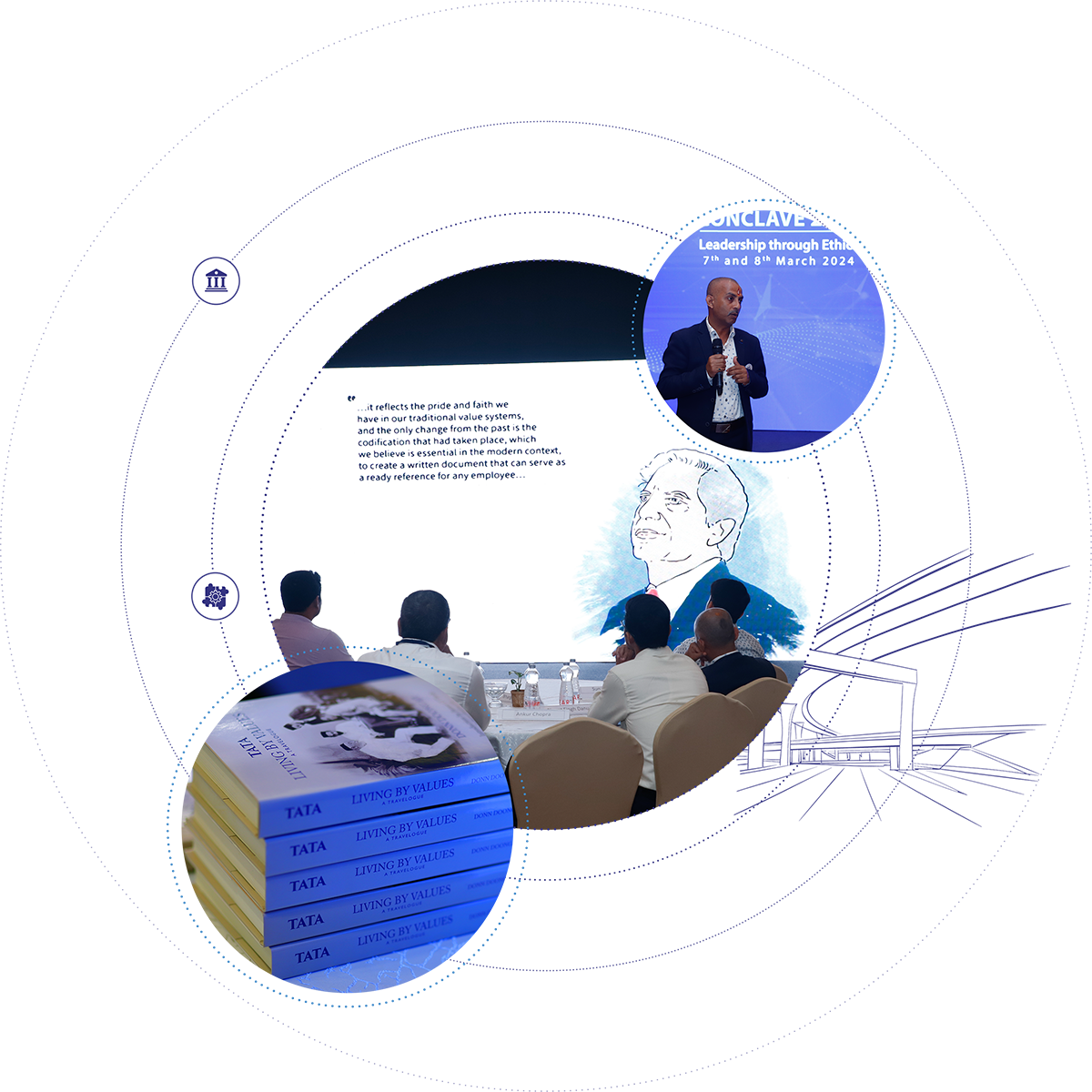
Corporate Governance
Leading with Integrity: Governance and Ethics in Focus
Tata Projects firmly believes in a business ethos driven by transparency, integrity, and value. Our culture is built on core values ingrained by the Tata Group.
Our Corporate Governance framework serves as the backbone for implementing and upholding robust structures, systems, and processes. We adhere to these standards across our organisation, promoting best practices, aligning with our long-term objectives, and ensuring compliance with internationally recognised standards.
Tata Group – Core Values
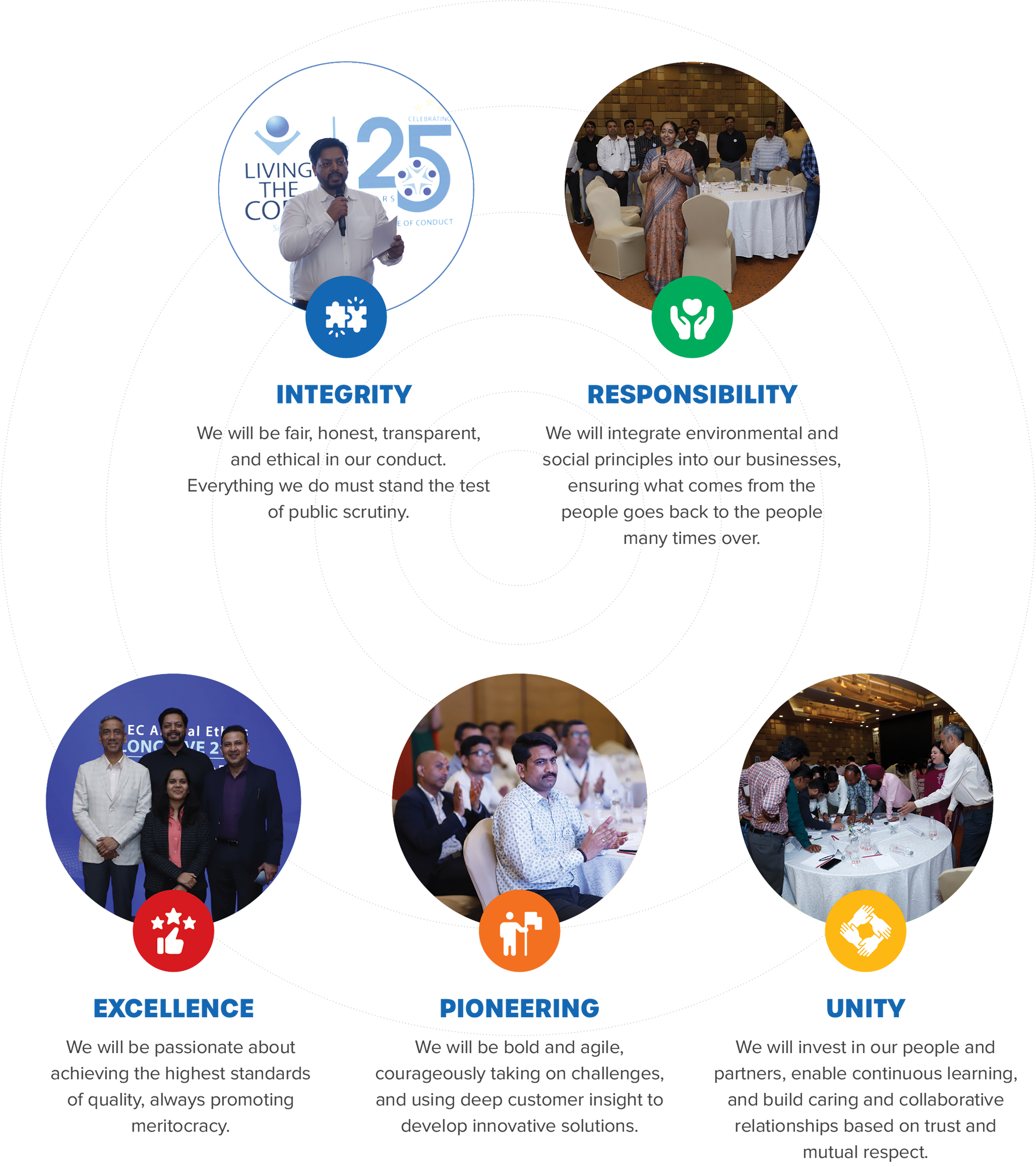
Corporate Governance Structure
Organisational Structure
Our track record of delivering complex projects on schedule while upholding the highest quality standards is a testament to the expertise of our esteemed Board of Directors and the steadfast leadership of our team.
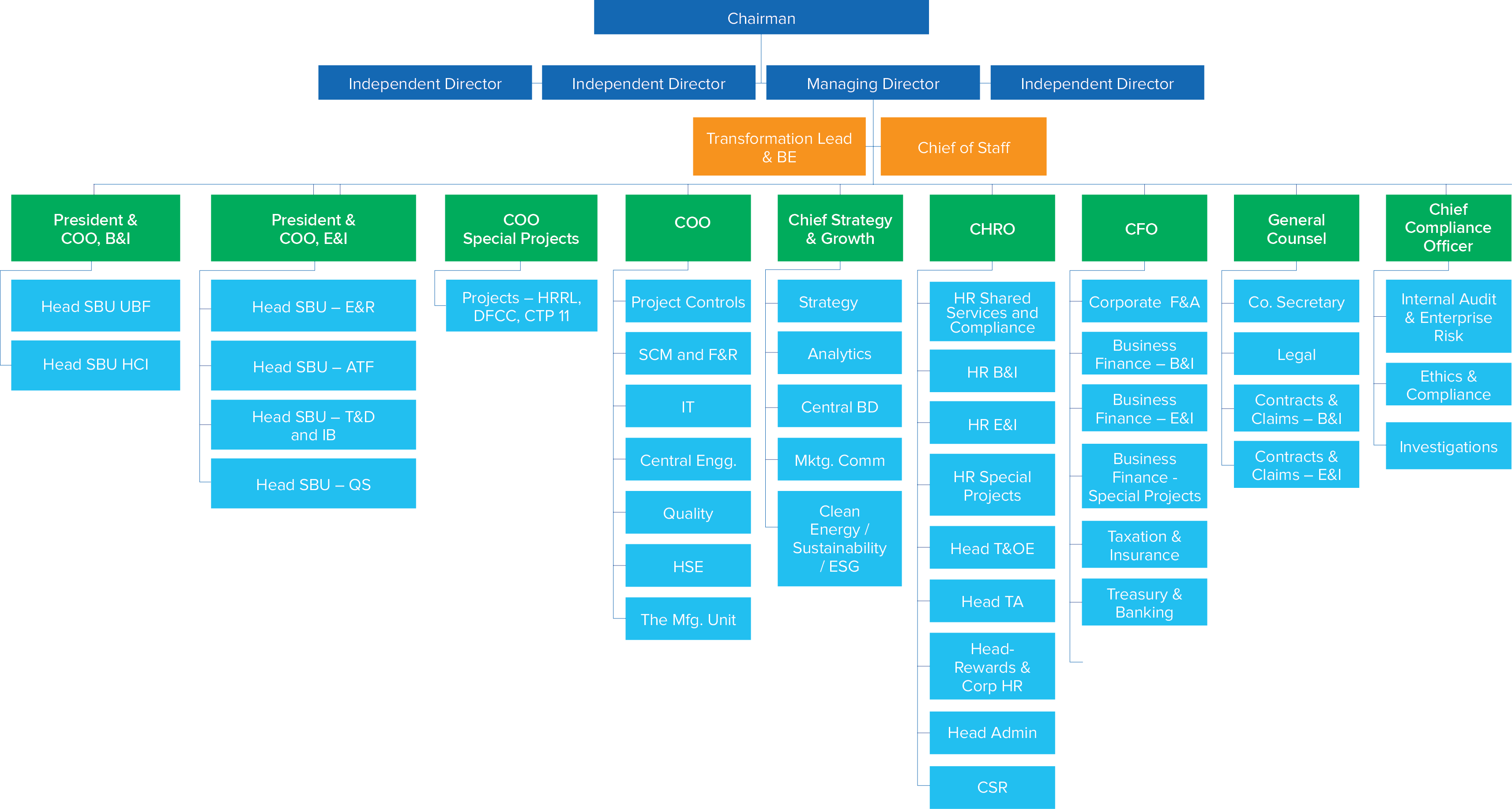
Governance Framework and Board Operations
Our governance framework establishes strategic guidelines for achieving our sustainability goals. The Board of Directors (‘Board’) is central to our corporate governance system. To ensure effective decision-making and long-term success, the Board is tasked with overseeing regulatory compliance, risk management, corporate social responsibility (CSR), and sustainability, while upholding ethical and transparent business practices.
Board and Committee Meetings
Meetings of the Board and its Committees are scheduled in advance, with a tentative annual calendar distributed to Directors to facilitate their planning and ensure meaningful participation. In cases of urgent business needs, the Board's
approval may be obtained through resolutions circulated as permitted by law, which are then noted and confirmed at subsequent Board meetings.
Meeting effectiveness is ensured through:
- Detailed Agendas: Provided ahead of meetings.
- Advance Circulation of Materials: In accordance with statutory timelines.
- Detailed Presentations: At each meeting.
- Action Tracking: Monitoring action items at every meeting.
Meetings are also attended by senior leadership members as invitees, providing additional accountability and developmental insights based on the agenda.
The Company Secretary is responsible for tracking and monitoring the Board and Committee proceedings to ensure adherence to terms of reference/charters, proper recording of decisions in the minutes, and tracking actions taken. Terms
of reference/charters are periodically updated to align with evolving statutes.
Health and Safety Initiatives
The Company adopts a ‘Safety-First’ approach. Regular reviews by the Board cover health and safety initiatives, reportable incidents, and corrective and preventive actions taken by management.
Strategic Oversight
The Board plays a critical role in developing the Company’s strategy. To support this, the CEO & Managing Director provides quarterly updates on overall performance, including that of subsidiaries. The Board periodically reviews:
- Strategy and Annual Business Plan
- Business Performance
- Technology and Innovation
- Quality and Customer Centricity
- Capital Expenditure Budgets
- Risk Management
- Safety and Environmental Matters
The Board also reviews compliance with applicable laws, internal financial controls, financial reporting systems, and minutes from subsidiary Board meetings. Quarterly, half-yearly, and annual results, corporate restructuring, and minutes
from Audit and other Committee meetings are also reviewed.
All Board and Committee meetings are conducted paperlessly, with documents securely uploaded to the Board Application and accessed online. This approach saves paper, reduces document cycle times, and enhances confidentiality.
Business Ethics and Compliance
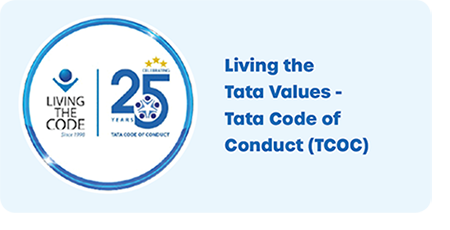
The Tata Code of Conduct (TCOC) embodies the values and principles that govern the behaviour of our companies and colleagues in all business matters. It serves as a guiding beacon and foundation upon which the Group’s individual and leadership commitments to the TATA Values are built. The TCOC underscores the Group’s dedication to every stakeholder, including the communities in which it operates. While the Code is periodically updated to reflect changes in laws and regulations, its fundamental principles remain unchanged.
Additionally, we have various policies that our employees are trained on, including Anti-Bribery and Anti-Corruption (ABAC), Anti-Fraud, Risk Management, Gifts, and Conflict of Interest. We plan to introduce training programmes onemerging risk areas and more nuanced topics in the future. We use different formats, such as short learning bytes and comic strips, to enhance colleague engagement and make learning more curiosity-driven
Apex Ethics Council (AEC)
The Apex Ethics Council (AEC) of Tata Projects, comprising the MD, CEC, CHRO, and Head–E&C, is the governing body for Ethics and Compliance. It ensures effective implementation of the TCOC and related policies, oversees the ‘Leadership of Business Ethics’ plan, monitors initiatives, and guides future directions. Additionally, it supervises violation instances, oversees investigations, and provides disciplinary recommendations. Committed to upholding business ethics leadership, the AEC fosters a culture of integrity and compliance within the organisation.
Ethics Week
Ethics Week, held annually during Founders Week, pays tribute to our Founder, Jamsetji Tata, and the values he instilled in the Tata group. In 2024, the week featured activities like ‘Leader Messages’, ethics quizzes and games, and a gathering of around 45 Local Ethics Counsellors (LECs). Sessions with internal and external speakers covered risk management, ethics, and team activities, enriching attendees’ knowledge with best practices.
Internal Communication Strategy on Ethics and Compliance
The new Mission Vision and Values coined by the senior leadership has 'Safety and Integrity first' as one of the core values with a deliberate inclusion of the word ‘first’ to emphasise that Safety and Integrity cannot be compromised. This reflects Leadership commitment to Ethics & Compliance and Safety. The communication plan for E&C thus revolves around Tata Group and Tata Projects’ commitment to Integrity and includes posters, email campaigns, quizzes, leadership messages, video bytes, trainings, vendor outreach programmes, and cascading of the same via value workshops, townhalls, business review meetings and many other forums.
Future Strategies
We plan to enrich our training programme with more engaging content like videos and quizzes. We will cover nuanced topics such as conflict of interest and anti-trust for colleagues and extend training to external stakeholders. We will also enhance learning for our LECs through partnerships with external resources. Leveraging technology, we aim to strengthen third-party risk management and proactive data analytics.
Board Composition and Appointment Policy
The Company recognises that diversity at the board level is essential for an effective board. A combination of executive, independent, and non-executive directors is a key aspect of the diverse attributes the Company seeks. Additionally, a board that represents various differences in educational qualifications, knowledge, experience, gender, age, cultural background, race, ethnicity, nationality, thought perspective, and other diversity factors delivers a competitive advantage and addresses the interests of our stakeholders in a better way. All board appointments are made on merit, considering this policy.
Attributes of Directors:
- Gender Diversity: The board should include at least one woman director.
- Competency: The board should have a mix of members with diverse educational qualifications, knowledge, and adequate experience in finance, accounting, economics, legal and regulatory matters, environmental issues, green technologies, and other disciplines related to the Company’s business.
- Independence: Independent directors should meet the requirements of the Companies Act, 2013 ('the Act') and the Securities and Exchange Board of India (Listing Obligations and Disclosure Requirements) Regulations, 2015 concerning 'independence.'
Additional Attributes:
- Directors should not have any pecuniary relationships with the Company, its subsidiaries, associates, joint ventures, or its promoters, other than sitting fees and commissions.
- Directors should not have any relatives (as defined in the Act and its rules) serving as directors, employees, or stakeholders (beyond immaterial dealings) of the Company, its subsidiaries, associates, or joint ventures.
- Directors should maintain an arm’s length relationship with employees of the Company, as well as with directors and employees of its subsidiaries, associates, joint ventures, promoters, and stakeholders with material relationships.
- Directors should not be subject to allegations of illegal or unethical behavior in their private or professional lives.
- Directors should be able to devote sufficient time to the Company’s affairs.
The Nomination and Remuneration Committee ('the NRC') is responsible for reviewing and assessing board composition and recommending the appointment or reappointment of independent directors. The process, overseen by the NRC, includes identifying potential candidates, evaluating their qualifications, conducting interviews, assessing their potential contribution to the board’s decision-making and effectiveness, and making final recommendations to the Board of Directors. This process ensures a transparent and rigorous selection. All board appointments are made on merit, considering the criteria outlined above.
A Diversified Board
We have 5 Board members, of whom 3 are Independent Directors. The Board meets every quarter to review the Company’s quarterly performance. No new director was appointed during FY2024. Our senior management team members were born in India. There were no foreign nationals present in FY2024.
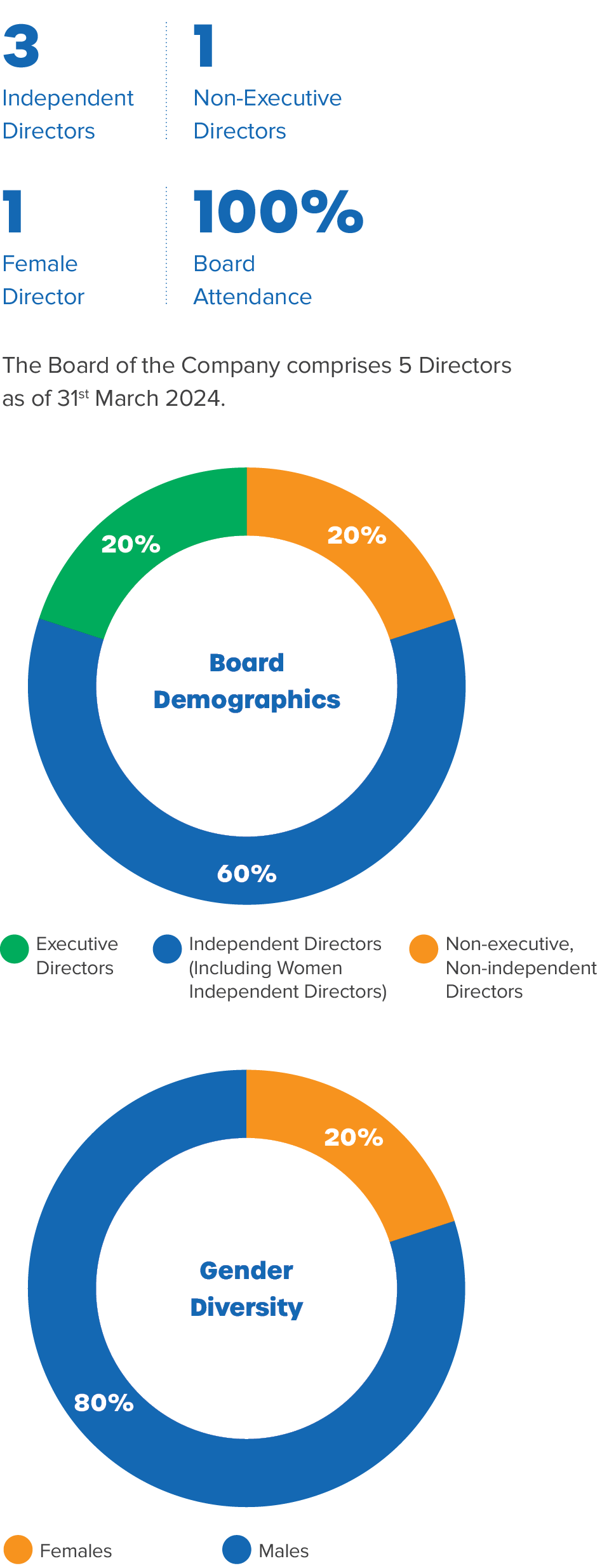
Board of Directors
With an unwavering commitment to governance, we have established a governance framework with the Board of Directors at its pinnacle. The Board oversees Committees dedicated to specific functions, which, in turn, collaborate with the leadership
teams, ensuring informed decision-making at every level of the Company.
Board members receive necessary documents, brochures, reports, and internal policies to familiarise themselves with our procedures and practices. Periodic presentations at Board and Committee meetings provide business updates, strategy,
and risk assessments. Upon appointment, Independent and Executive Directors receive detailed letters outlining their terms, duties, and responsibilities. Non-Executive and Independent Directors participate in interactive sessions with
management and business leaders.
Out of the five directors, four are eligible for pension benefits upon retirement, reflecting the value of their long-term service as outlined in their contracts. This ensures that we recognise and reward the dedication of our senior
leadership.
Sanjeev Churivala has been added as our board of director from 1st July 2024
Below is the tenure of Mancomm members as on 31st March 2024:
| Employee Name | Tenure (Years) |
| Mr. Apeksha Balan | 4.8 |
| Mr. Himanshu Chaturvedi | 6.1 |
| Mr. Deepak Natarajan | 4.2 |
| Mr. Sanjay Sharma | 2.3 |
| Mr. Pratixa Satish Davawala | 1.7 |
| Mr. Neeraj Agrawal | 1.5 |
| Ms. Rashna Mistry | 1.2 |
| Mr. Phani Kumar K | 0.2 |
| Mr. Raman Kapil | 8.5 |
| Mr. Vinayak Pai | 2.2 |
| Mr. Rajiv Menon | 1.5 |
| Mr. Ritesh Pratap Singh | 0.6 |
Board Meetings – FY2024
| Board Meeting | 7 |
| Audit Committee Meeting | 8 |
| Nomination & Remuneration Committee Meeting | 5 |
| CSR & ESG Committee Meeting | 3 |
| Projects Review Committee Meeting | 0 |
| Stakeholders Relationship Committee | 1 |
| Risk Management Committee | 2 |
| Securities Allotment Committee | 0 |
Management Committee Composition and Gender Diversity Overview
As of March 31, 2024, the Management Committee consists of 12 members, with a gender distribution of 9 males and 3 females. The average age of the committee is 49.83 years, with members ranging from 43 to 57 years old. The age distribution
includes 6 members aged 41-50 and 6 members aged 51-60.
For FY2024, gender diversity details are provided as follows:
- Overall: 7.40%
- CxO Positions: 22%
- Managerial Roles:
- Senior: 6%
- Middle: 4%
- Junior: 9%
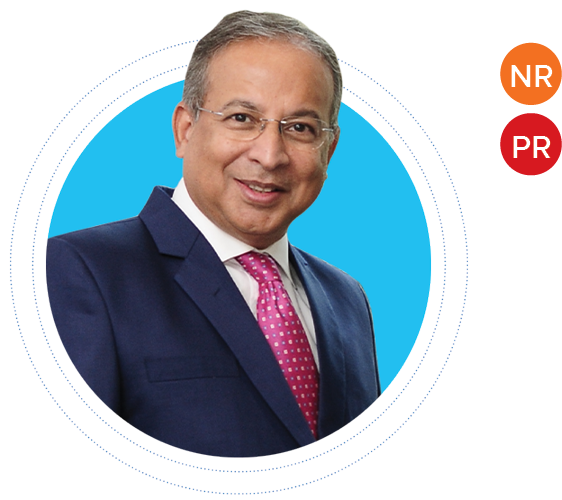
Dr. Praveer Sinha
Chairman
Dr. Sinha is the MD and CEO of Tata Power. With his expertise in the power sector, he is leading Tata Power’s transition into a sustainable and customer-centric green energy solutions company while fostering collaborations for clean energy innovations. With a background in Electrical Engineering and advanced degrees, including a Ph.D. Dr. Sinha brings a wealth of expertise to his role. He also serves as a visiting faculty member at MIT.
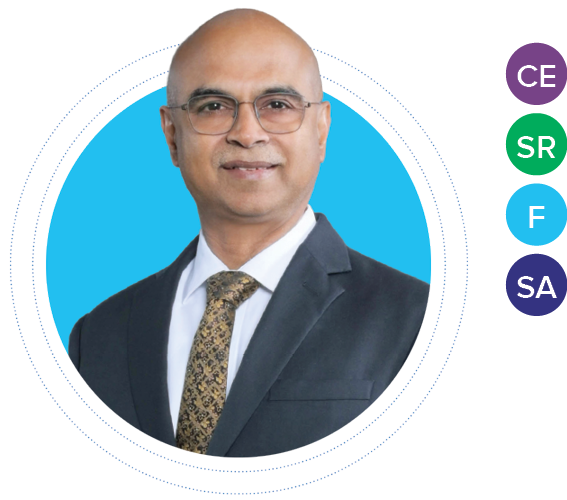
Vinayak Pai
Managing Director and Chief Executive Officer
Vinayak Pai, formerly the Group President at Worley, demonstrated exceptional leadership skills in overseeing their businesses in the EMEA and APAC regions. With a distinguished career spanning over three decades in the Oil and Gas industry, he has successfully executed upstream and downstream projects, fostered business growth, and excelled in various key roles, including Engineering Design, Project Management, and Business Development.
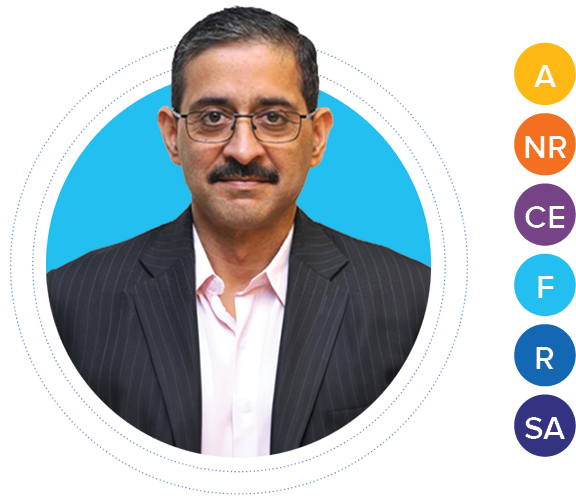
Sanjay Bhandarkar
Independent Director
Sanjay Bhandarkar led Rothschild India till 2016 when he stepped down from a full-time role. With a rich corporate finance and investment banking background, he brings valuable expertise to the boards of Tata Power, S Chand & Company, HDFC Asset Management, and the National Investment and Infrastructure Fund. He holds an MBA from XLRI, Jamshedpur.
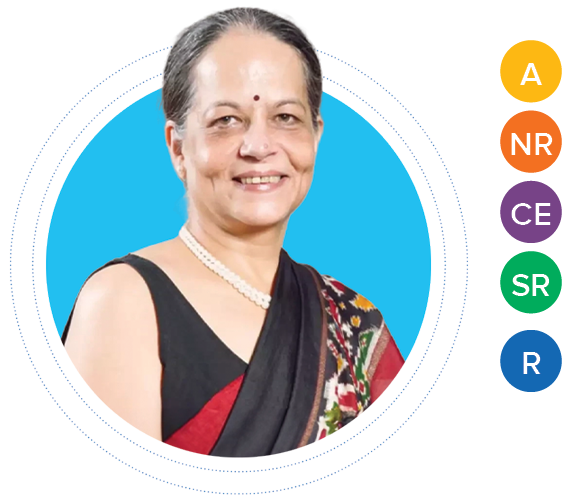
Nishi Vasudeva
Independent Director
Nishi Vasudeva, the former Chief Managing Director of Hindustan Petroleum Corporation Limited (HPCL), made history as the first woman to lead an oil company in India and one of the few globally. Her visionary leadership at HPCL resulted in remarkable growth, profitability, and value creation. With a career spanning over 38 years in the petroleum industry, she has received prestigious accolades such as the Platts 'Global CEO of the Year' in the energy sector and the SCOPE award for her exceptional contributions to public sector management.
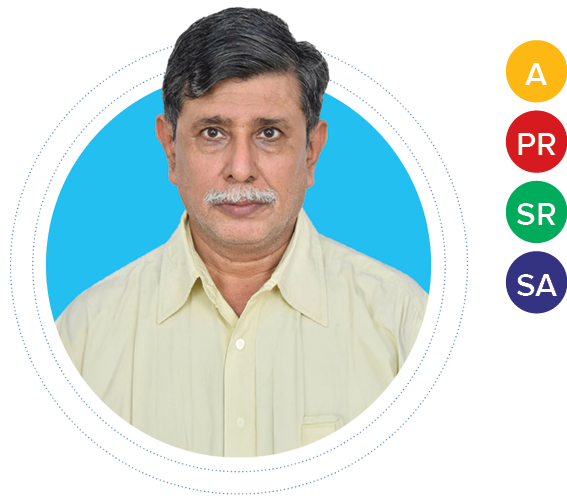
T.R. Rangarajan
Independent Director
During his tenure as Executive Director at Engineers India Limited (EIL), T.R. Rangarajan made significant contributions to project execution across diverse sectors, including offshore, terminals, pipelines, and petrochemicals. His expertise extends to project management and technical consultancy, particularly in the field of polymers. He holds a Bachelor’s degree in Chemical Engineering from Annamalai University.
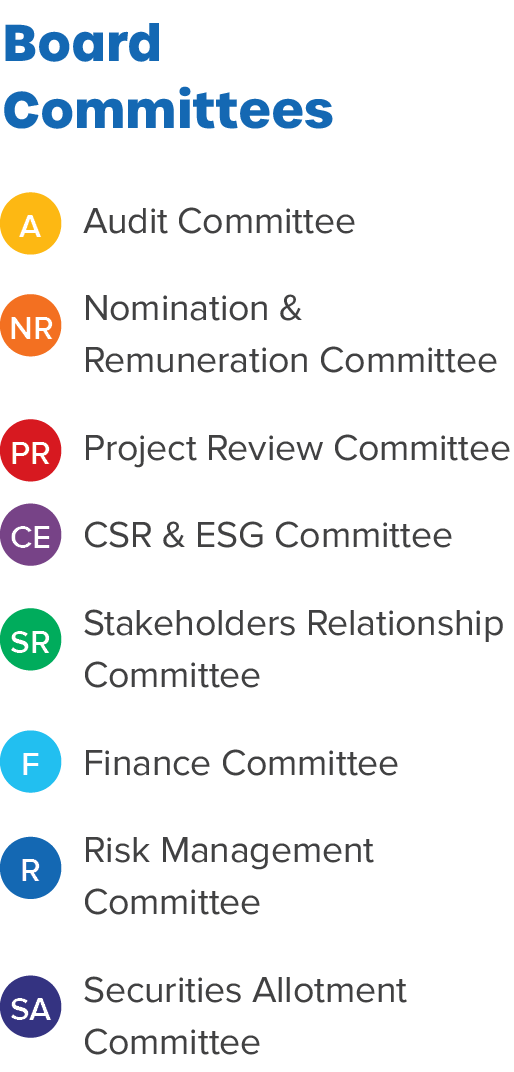
Compensation Ratio
The ratio of the annual total compensation for the organisation’s highest-paid individual to the median annual total compensation for all employees for the FY2024 and the percentage increase in the remuneration of the highest paid individual during the FY2024.
| Name | Position | Ratio of Remuneration to median remuneration | Percentage Increase in Remuneration |
| Vinayak Ratnakar Pai | Managing Director | 81.33 | 64.3% |
*Percentage increase for Mr. Pai will not be comparable with previous year as his appointment as MD was made on 22nd July 2022 and no bonus payout was done in his first year.
Percentage increase in the median remuneration of employees as of 31st March, 2024 is 12.5%.
The ratio of the percentage increase in annual total compensation for the organisation’s highest-paid individual to the median percentage increase in annual total compensation for all employees is 5.17.
Key Compliance & Ethics Trainings
Mandatory pre-joiner, new joiner, and annual refresher e-learning modules, followed by an affirmative declaration, are implemented formally via the Learning Management System.
Targeted face-to-face sessions and awareness sessions on the Code of Conduct for project sites using a risk-based approach, allowing employees to ask questions, clarify doubts, and provide further feedback.
Induction training for different groups, such as trainees and engineers.
A Supplier Code of Conduct for suppliers and risk-based in-person training for compliance-sensitive vendors.
Leadership toolkits on ethical leadership.
>99%
Completion rates for refresher cycle for ABAC and TCOC in FY2024
Non-compliance with laws and regulations in the social and economic area and fines
₹12,71,062
Total monetary value of significant fines
0
Total number of non-monetary sanctions
0
Non-compliance with environmental laws and regulations
Performance Evaluation of the Board and its Members
All the Board Members of the Company are accorded every opportunity to familiarise themselves with the Company, it’s management, it’s operations and above all, the industry perspective and issues. Also, the board encourages attendance at continuing education programmes, which may include internal strategy meetings, third-party presentations, and externally offered programmes.
The Company has implemented various measures to enhance the knowledge, skills, and expertise of its Board of Directors with a specific emphasis on sustainable development. Directors receive continuous support through regular briefings, keeping them abreast of the Company’s operations, strategic priorities, and environmental, social, and governance (ESG) matters, including sustainable development efforts. These initiatives aim to keep directors informed and engaged, enabling them to make informed decisions in line with the Company’s long-term sustainability goals. Through robust orientation and ongoing updates, the highest governance body is well-prepared to address sustainability challenges and opportunities effectively.
Performance Evaluation Process:
In compliance with the Companies Act, 2013, and the Securities and Exchange Board of India (Listing Obligations and Disclosure Requirements) Regulations, 2015, the performance of the Board, its Committees, and individual Directors is evaluated annually.
- Board Evaluation: The Board evaluates its performance based on criteria such as composition, structure, effectiveness of processes, and functioning. Feedback is solicited from all Directors to ensure a comprehensive assessment.
- Committee Evaluation: The performance of various Committees is assessed based on criteria such as composition and effectiveness of meetings, with input from Committee members.
- Independent Directors' Evaluation: Independent Directors separately evaluate the performance of non-independent Directors, the Board as a whole, and the Chairman.
- Nomination and Remuneration Committee (NRC) Evaluation: The NRC reviews the performance of Independent Directors based on their contributions to Board and Committee meetings, including preparedness, constructive input, and overall effectiveness. The NRC also evaluates the performance of Senior Management (Direct reports to the Managing Director) as part of the Performance Management System. This includes setting financial key performance indicators (KPIs) and other metrics for the financial year, which are reviewed and presented to the Board.
Action and Follow-Up:
The performance evaluation process is conducted in-house using the Board Application. The NRC Chair shares the results with the Board Members, and suggestions are noted and communicated to relevant internal stakeholders for necessary action.
Additionally, the NRC conducts an annual, systematic evaluation of Senior Management performance. This evaluation involves setting and reviewing financial and non-financial KPIs and leadership capabilities. A potential assessment is carried out, leading to discussions on individual development needs. The outcomes are formally endorsed by the Board, resulting in the formulation of tailored action plans designed to enhance leadership effectiveness and contribute to the Organisation’s overall success and growth.
Processes Determining Remuneration Policies
- We regularly seek inputs on remuneration related policies from internal stakeholders (Business HRs, HR leaders, employee feedback) through following mechanisms:
- Internal analysis of attrition, hiring and compensation data
- Regular HR reviews and interactions
- Employee surveys – Engagement Survey, Exit Interviews, Exit Survey, Onboarding survey - Track market trends through various survey reports published by reputed Consultants
- We also engage external consultants to conduct benchmarking surveys
- Any new policy is reviewed internally within the HR function and then presented to the Management Committee, before release. Management Consultants may be involved in recommending policy guidelines
- Annual Compensation and Variable Pay Proposal is reviewed by the Nominations & Remuneration Committee (NRC) of the Board. The NRC also reviews and recommends executive compensation and Long-Term Incentive Plans
Anti-Corruption
- Total number and percentage of business partners that the organisation’s anti-corruption policies and procedures have been communicated to, broken down by type of business partner and region: Our Supplier Code of Conduct (COC) communication was sent to all suppliers
- The Supplier Code of Conduct (COC) is disseminated to all suppliers via a Vendor Outreach programme, ensuring full coverage. Work Order General Conditions mandate adherence to both TCOC and the Supplier COC. Our Supplier COC, aligned with TCOC principles, covers safety, quality, integrity, anti-bribery, anti-corruption, data privacy, and confidentiality. Work orders also feature Business Ethics clauses to reinforce policy communication and adherence. Our conflict of interest policy & Supplier code of conduct is publicly accessible at the following link which covers Freedom of Association and Collective Bargaining, Child labour, Forced or compulsory labour: https://www.tataprojects.com/policies-and-charters
- Legal Actions - pending or completed during the reporting period - Regarding anti-competitive behaviour and violations of anti-trust and monopoly legislation in which Tata Projects has been identified as a participant: 0
- Total number and percentage of operations assessed for risks related to corruption: The risk of corruption runs across the entire organisation and we have processes at the Company level to mitigate the same
- Significant risks related to corruption identified through the risk assessment: as per our ERM process, we have identified 1 E&C risk and 4 root causes
- Total number and percentage of governance body members that the organisation’s anti-corruption policies and procedures have been communicated to, broken down by region: 100% (communication is to 100%, training % is given above)
- Total number and percentage of employees that the organisation’s anti-corruption policies and procedures have been communicated to, broken down by employee category and region: 100% (communication is to 100%, training % is given above)
- Total number and nature of confirmed incidents of corruption: 0
Tata Projects Limited communicates its anti-corruption policies through internal channels like the intranet portal – HUB, townhalls, posters, workshops, quiz, newsletters, ethics week celebrations, founder’s day celebrations, mission, vision and values workshops and external channels via contracts and official communications. Regular training sessions are held for employees and stakeholders, including suppliers and contractors. Compliance is monitored through audits and a confidential whistle-blower mechanism overseen by the Audit Committee. This comprehensive approach ensures robust communication and training on anti-corruption policies, fostering a culture of integrity and transparency.
Anti-Competitive Behaviour
Number of legal actions pending or completed during the reporting period regarding anti-competitive behaviour and violations of anti-trust and monopoly legislation in which the organisation has been identified as a participant: 0
| Non-compliance with laws and regulations in the social and economic area and fines |
Number of Confirmed Incidents |
Nature of Incidents | Legal Action Taken | Status / Main Outcomes of Completed Legal Actions |
| 5 | Non-Compliance of Contract Labour Act / Payment of Wages act / Minimum Wages Act | Compliances ensured. Fine paid (`7,000 in all) | Tata Projects paid the fine, case closed |
Data Privacy
Tata Projects has implemented a robust Data Privacy Policy since FY2024, outlining procedures for acquiring, utilising, and safeguarding personal information of employees, customers, contractors, and third parties. The Policy extends its applicability to all involved parties. It covers collection, processing, storage, protection, transfer, and disposal of personal data by Tata Projects, with guidelines for data collection, retention, accuracy, and sharing. The Policy aligns with ISO 27001:2013 standards, particularly concerning confidentiality agreements, protection of records, and privacy of personally identifiable information.
Tata Projects prioritises data security, implementing rigorous measures to safeguard personal information. Industry-standard protocols include encryption during transmission / storage, access controls, security audits, and employee awareness sessions. Secure storage environments employ firewalls and intrusion detection systems. Prompt assessment, mitigation, and legal compliance are ensured in case of breaches. Third-party providers undergo careful selection and contractual agreements for data protection. Users are encouraged to maintain security through good practices and report suspected breaches promptly.
Reporting of Critical Concerns
During the reporting period, Tata Projects Limited actively engaged with various stakeholders through multiple platforms, including our designated email channels, website, and shareholder meetings. Issues requiring reporting as per the Company policies of critical concern were duly systematically reported to the audit committee and the Apex Ethics Council to ensure prompt attention and resolution. In total, 93 concerns including critical and low risk were reported to the mentioned governing bodies reflecting our commitment to transparency and responsiveness to stakeholder needs. These concerns were thoroughly reviewed, and appropriate actions were taken to address each issue.
Communication and Embedding of Policy Commitments
ata Projects Limited communicates its policy commitments through the Company website, newsletters, press releases, annual reports, and internal channels such as training programmes and the intranet. Formal discussions occur during stakeholder and board meetings, ensuring feedback and engagement. The Risk Management and Audit Committees monitor policy implementation, conducting regular audits and compliance checks. Employees receive training on key policies, including anti-bribery, risk management, TCOC, POSH and corporate social responsibility, ensuring understanding and adherence. This systematic approach ensures that policy commitments are deeply embedded in the Company's operations and culture.
Remediation of Negative Impacts
Tata Projects has established processes to remediate negative impacts arising from its operations. This includes a structured grievance mechanism allowing stakeholders to report issues, which are then investigated and addressed promptly by the relevant departments. The Company is committed to corrective actions and continuous improvement to mitigate future risks.
Mechanisms for Seeking Advice and Raising Concerns
To strengthen mechanisms for seeking advice and raising concerns, Tata Projects has implemented a Whistle-Blower Policy and Disciplinary Framework. These mechanisms provide employees and stakeholders with confidential channels to report unethical behavior, violations of policy, or any other concerns. Reports are reviewed by the Apex Ethics Council with quarterly updates to the Audit Committee, ensuring impartiality and appropriate action. Regular training sessions and communication campaigns are conducted to inform employees about these mechanisms and encourage their use. Various channels for communications that are used are Townhalls, internal communications like internal branding, emails, quiz, workshops and intranet portal - HUB
This systematic approach ensures that policy commitments are deeply embedded in the Company's operations and culture, fostering a responsible and transparent business environment.

